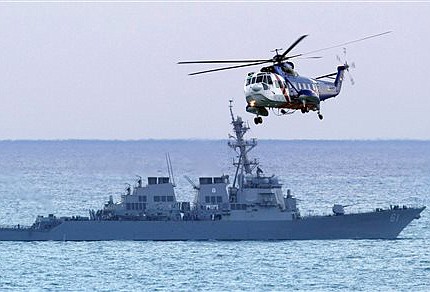Syria watch: Corker, Gen. Bell, locals from greater Chattanooga area eye prospect of military action
Thursday, August 29, 2013
As prospects mounted Wednesday for military strikes on Syria, with or without U.N. approval, some military veterans in Chattanooga spoke about America's role and the responsibilities of a war-weary nation.
Two retired generals took opposing views, with Army Gen. Burwell "BB" Bell saying the U.S. needs to protect its interests, even if that means a prolonged bombing campaign.
Retired Army Gen. Bob Woods prefers to see a Syrian response from the international community.
"I don't think America is ready to engage somewhere on the other side of the world where they don't see any immediate concern for why we should possibly deploy again," said Woods, who now lives in Rising Fawn, Ga.
The comments came as U.S. Navy ships moved closer to Syria, President Barack Obama considered the nation's options and U.S. Sen. Bob Corker, who supports airstrikes against the Middle Eastern country, made a stop in Chattanooga and renewed his call for action.
The Tennessee Republican, ranking member on the Senate Foreign Relations Committee, told Chattanooga businesspeople that the Syrian regime's chemical attacks call out for a response, especially since Obama previously drew a red line warning against such actions."Whether you like the president or not, the fact is when the president of the United States has said publicly that there is a red line and that red line has been crossed, it ends up affecting many other things if the U.S. does not take action," Corker said. "You've got to believe that the leaders in Iran, who we have also talked to about the development of a nuclear weapon, are watching the United States to see if we are going to follow on regarding red lines being crossed."
Corker said he wishes the Obama administration would take its case for any military action in Syria to the Congress and the American people.
"I wish that Congress would vote on this, but I don't expect that to happen," Corker said. "Congress has been shielded from any kind of foreign policy decisions for too long. When the Senate and the House don't have to be responsible or take ownership of the things that we do relative to foreign policy, the debate can become awfully sophomoric, silly and partisan and I think it's bad for our nation when Congress is not involved. I think it's the right thing for the American people for the administration to make its case to the Congress."
VIDEO
This story is featured in today's TimesFreePress newscast.
Bell, who commanded U.S. forces in Europe and prepared units for deployment to Iraq before his retirement, said the United States needs to protect its national interests in the Middle East. Those interests justify not only what some have called a retaliatory "surgical strike," but a long-term bombing campaign aimed at helping Syrian rebels overthrow President Bashar Assad, he said.
"As ghastly and horrible as chemical strikes are, they don't compare to the number of people Bashar al-Assad has killed over the last couple of years," Bell said. Syria is an ally of Iran, which aims to become a nuclear power and dominate the Middle East, he said. America's national interest in protecting its friend Israel, stemming Iranian ambitions and maintaining a free flow of oil justify action, said Bell, who lives in Ooltewah.
"That would mean a longer and more sustained bombing campaign than a simple retaliation strike and would require our allies in the U.N. and NATO to support a bombing campaign that would reduce Bashar al-Assad's capability to fight this war against the rebels and give them a chance to overthrow him over the next few months."
A weekslong bombing campaign would be "low risk to United States military personnel and have a high payoff for the rebels," he said.
"We would be better off supporting any faction that is anti-Bashar al-Assad than continuing to watch Bashar al-Assad's regime help Iran arm and train terrorists. While there's great concern that some of the Sunni groups could also be anti-U.S., even al-Quaida sympathizers, my belief is that the overthrow of Bashar al-Assad is in the United States' interest and we should support that."
But Woods, who retired in 2009 as commanding general of the 32nd Army Air Missile Defense Command in Fort Bliss, Texas, said the response should come from the international community.
Over 12 years of war in Iraq and Afghanistan, the U.S. has lost more than 6,600 people and spent around $2 trillion. Some estimates put the eventual cost of the conflicts at $4 trillion to $6 trillion.
"America has been ready for our men and women to come home," said Woods, who deployed to seven Middle Eastern countries with his command and whose sons served in Iraq and Afghanistan.
"If Syria is of international concern, let the international community use other means if possible -- economic sanctions, etc. -- before we commit military forces to deploy to Syria."
If America decides to intervene, he said, "we should know exactly why we're going there and, just as important, we need to know when we would leave."
A veteran who has seen combat agreed that Americans ought to be better-educated about what their leaders are considering doing halfway around the world.
"If we've learned anything in the last 12 years, it's that when the government decides to go to war, it's the populace that pays the consequences," said retired Marine Staff Sgt. Joey Jones, of Dalton, Ga., who lost both legs in a bombing in Afghanistan. He's medically retired and attending college and working.
"The American people end up paying the price in the lives of their sons and daughters, in the soldiers, sailors, airmen and Marines that come back mentally ill, permanently injured or in a box.
"We're always going to have a decent reason to go to war, as long as we're a country that believes in taking care of human rights and freedom for people, but before we do it, the American people have to be part of the conversation. It's time for average people of average intelligence to educate themselves, have a collective voice and at least ask questions."
Contact staff writer Judy Walton at jwalton@timesfreepress.com or 423-757-6416.


